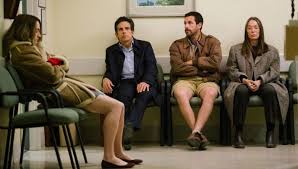Movie Review of DISCONNECT, ARTHUR NEWMAN and THE ICEMAN by Howard Casner
Posted: May 8, 2013 | Author: Donald | Filed under: Uncategorized | Tags: Alexander Skarsgard, Andrew Stern, Ariel Vromen, Arthur Newman, Becky Johnston, Chris Evans, Colin Firth, Dante Ariola, David Schwimmer, Disconnect, Emily Blunt, Henry Alex Rubin, Hope Davis, Jason Bateman, Michael Nyqvist, Michael Shannon, Morgan Land, Ray Liotta, The Iceman, Winona Ryder | 3,465 Comments »Disconnect, the new techno-thriller from writer Andrew Stern and director Henry Alex Rubin, spends half its time preaching the horrors of modern computer technology and all the evils it can spawn, and then seems to change its mind and spend the other half telling us how that very same technology (and the evil it spawns) can bring estranged people together and save our souls by revealing who we really are. One might think that the filmmakers were going for irony, but I have to be honest and say I think irony was the last thing in play here. For me, the driving force of the film was pandering to the audience with filmmakers taking a typical middlebrow approach to art: confront the audience with something important and even horrendous, but only to the degree that it doesn’t upset them too much and affect the box office.
Disconnect has several through lines in which people are linked in a sort of La Ronde relationship—one person in one story is connected in some way to a person in another. It never comes full circle, so it doesn’t quite fit the structure of Schnitzler’s legendary opus, but it is the cleverest aspect of the film and perhaps the only satisfactory irony to be found: we’re all disconnected due to the internet, yet we end up being even more connected than we thought.
The movie is ambitious and sincere, but never quite has the emotional impact it is aiming for. One reason for this is that for a thriller, Stern and Rubin aren’t able to really generate that many, well, thrills. There’s a lot of conflict, but precious little tension and it seems to take its time going anywhere. There could be several reasons for this. None of the various stories are all that original and their plot lines have few surprises; every turn is signaled well before it happens and the resolutions are rather ho-hum with a touch of LOL along for the ride (they all climax in a set of slow motion, Matrix like intercut sequences that were probably suppose to emphasize the tragedy of it all, but instead only doubled the over the top feeling that was already there).
In addition, each through line has enough going for it to be a whole movie unto itself; but by squeezing each plotline into the length of basically a half hour TV episode, it tended to also squeeze out all the suspense (I couldn’t help but think of what Alfred Hitchcock or Claude Chabrol could have done with just one of the stories). Finally, the whole thing just felt a bit too manipulated, never quite real, with characters that seemed more driven by the plot than the plot being driven by the characters; the result is that the more empathy the filmmakers tried to create for their characters, the less there was.
The acting is solid, but save for a couple of exceptions (Alexander Skarsgard as a victim of identity theft and Michael Nyqvist as someone who may or may not have stolen that identity), no one really rises above the limitations of the screenplay. Hope Davis is wasted in a minor role (and for some reason is given the thankless and perplexing task of not understanding why her husband, played by Jason Bateman, might actually want to find out why his son tried to kill himself). Everyone seems to wear their emotions on their sleeves. Subtle is not a word that might be used to describe the film.
In Sam Shepard’s great play The Curse of the Starving Class, there is a conversation that goes something like this: one character wants to move in order to get away from their present environment, but another character responds by saying, “…but we’ll still be the same people”. I couldn’t help but think of this when I saw Arthur Newman, a film about a man who creates a new identity for himself (yes, Virginia, Arthur’s last name is not the most subtle of choices here).
Colin Firth plays the title character, a Babbit in a grey, flannel suit (well, since he works for Fed Ex, brown khaki pants, but you get my drift). Arthur is a rather boring character, to be both blunt and kind. And when he’s fired from his place of employment, he decides to reboot his life. Unfortunately for him, and the audience, the new Arthur is as boring and uninteresting as his previous incarnation. To make matters worse, Firth uses a bland American accent that’s even more tedious than his personality.
Things pick up a bit when he meets Emily Blunt (as things are wont to do when one meets Emily Blunt), who plays a character who has identity issues of her own, issues compounded by a game she talks Arthur into playing in which they break into people’s homes, wear their victims’ clothes, eat their victims’ food, drink their wine and have sex in their beds.
In the end, screenwriter Becky Johnston and director Dante Ariola show great empathy for their characters, but the movie never really comes together. I suspect that this is because there are so many through lines going on (Arthur wanting to be a golf pro; Blunt’s issues; their sex games; Arthur’s failed relationship with his son), that the filmmakers can’t seem to find a way to weave them all together in a satisfactory whole.
The Iceman, the new crime drama by writers Ariel Vromen (who also directed) and Morgan Land, is a movie where Ray Liotta finally meets someone even more psychopathic than he is and where Winona Ryder, David Schwimmer and Chris Evans try to earn street cred by playing against type (for the record, Evans comes out best). There’s nothing really wrong with the movie. It gets the job done and I was never bored. Michael Shannon does very well in the title role. But in the end, it doesn’t come close to plumbing the existential depths of the television series Dexter and falls into the “if you’ve seen one contract killer movie, you’ve seen them all”.
Tell me what you think.










 For questions: hcasner@aol.com
For questions: hcasner@aol.com The Meyerwitz Stories (Both Old and New) opened both on the Netflix streaming platform and in the theaters at the same time. The goal, as I surmise it, it to have a qualifying run for the Oscar race (and screeners have been sent) while giving it as little theatrical distribution as possible.
The Meyerwitz Stories (Both Old and New) opened both on the Netflix streaming platform and in the theaters at the same time. The goal, as I surmise it, it to have a qualifying run for the Oscar race (and screeners have been sent) while giving it as little theatrical distribution as possible.
